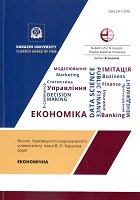Employment of polish students during the COVID-19 pandemic
Abstract
Rapidly increasing cost of living in Poland is reflected in a high professional activity of students. Currently, the majority of the students on the Polish labor market is employed on the basis of civil law agreements. Civil agreements do not guarantee a sense of security and they are attractive primarily for employers. The civil contract allows employers to reduce employment costs. Their attractiveness for the employees is connected with the flexibility of working time. The advantage for the students of performing work under civil agreements is that it allows them to combine study with work. But they prefer part-time work. Civil contracts are often pejoratively referred to as “junk contracts”, because they do not protect employee’s interests. This is particularly observed during a crisis (like in the current situation connected with the COVID-19 pandemic). The aim of this paper is to present the results of the analysis of the situation of working students and the possibility of its impact on anti-crisis actions taken by the government in order to protect society against the effects of the pandemic. The research was conducted among students of Lodz University of Technology (Poland) in the first quarter of 2020, with the use of an on-line survey. The study assumes that the preference of employers concerning the employment of students based on atypical forms results in the lack of protection in new and unpredictable situations such as the current one. The article determines students level of knowledge about the available forms of assistance under the Anti-Crisis Shield 2.0. The research shows that very few respondents are aware of the accessible assistance guaranteed by the Act.
Downloads
References
Report «Student’s Wallett».(2019). Retrieved from https://zbp.pl/getmedia/db30e431-257b-4b47-9942-e8164e844966/PortfelStudenta2019. (in Polish)
Report «Student at work 2019» (2020). Retrieved from https://hrpolska.pl/rynek-pracy/badania/raport-student-w-pracy-2019. (in Polish)
Embassy, B. (2018). Report «How do Poles like to work». Retrieved from https://be.prowly.com/13951-raport-brain-embassy-jak-polacy-lubia-pracowac. (in Polish)
Addor, M. L. (2011).Generation Z: What is the Future of Stakeholder Engagement? Retrieved from https://iei.ncsu.edu/wp content/uploads/2013/01/GenZStakeholders2.pdf
Report «Generational changes on the labor market-XYZ» (2018). Centrum Innowacji ProLearning. Retrieved from www.prolearning.pl.
Atkinson, J. (1984). Manpower strategies for flexible organizations. Personnel Management, 15(8), 28-31.
Handy, Ch. (1993).Understanding Organizations. New York: Oxford University Press.
Gray, A. (2004). Unsocial Europe. Social Protection or Flexploitation? London: Pluto Press.
Central Statistical Office. (2019). Retrieved from https://stat.gov.pl/.
Seemiller, C., Grace, M. (2016). Generation Z Goes to College. San Francisco: Wiley.
Report «Gen Z and Millennials collide at work» (2016). Retrieved from https://cdn2.hubspot.net/hubfs/409577/Pre-Team%20Drive%20PDFs/Gen_Z_Millennials_Collide_Report_Dec_2016.pdf.
Gajda, J. (2017). Expectations of representatives of generation Z towards work and employers. Research papers of Wrocław University of economics, 491, 158-171. doi: 10.15611/pn.2017.491.15.(in Polish)
Bohdziewicz, P. (2016). Career anchors of representatives of the Z generation: several applications for managing the youngest generation of employees. Human Resource Management, 6, 57-74. (in Polish)
Journal of Laws (2020). Act «On specific support instruments in connection with the spread of SARS-CoV-2 virus», item 695. Retrieved from https://orka.sejm.gov.pl/proc9.nsf/ustawy/324_u.htm. (in Polish)
Stankiewicz-Mróz, A. (2020). Perception of work flexibility among students as representatives of generation Z and employers from the SME sector. Human Resources Management, 1(132), 49-63. doi: 10.5604/01.3001.0013.8778.
Coronavirus and the labor market. (2020). Retrieved from https://innpoland.pl/159181,koronawirus-a-rynek-pracy. (in Polish)
March lavina of release "Anti-crisis shields" (2020). Retrieved from https://pracodawcyrp.pl/aktualnosci-koronawirus/marcowa-lawina-zwolnien-zmiotla-tarcze-antykryzysowe. (in Polish)

